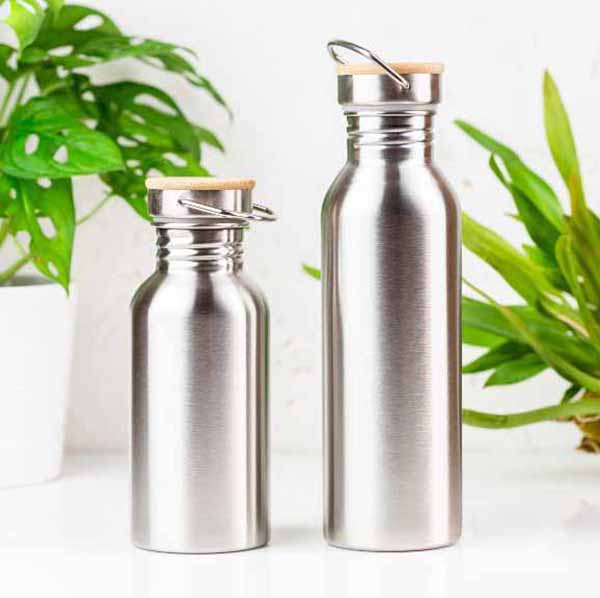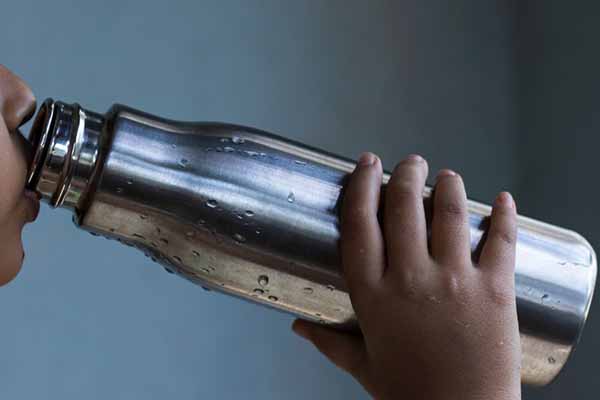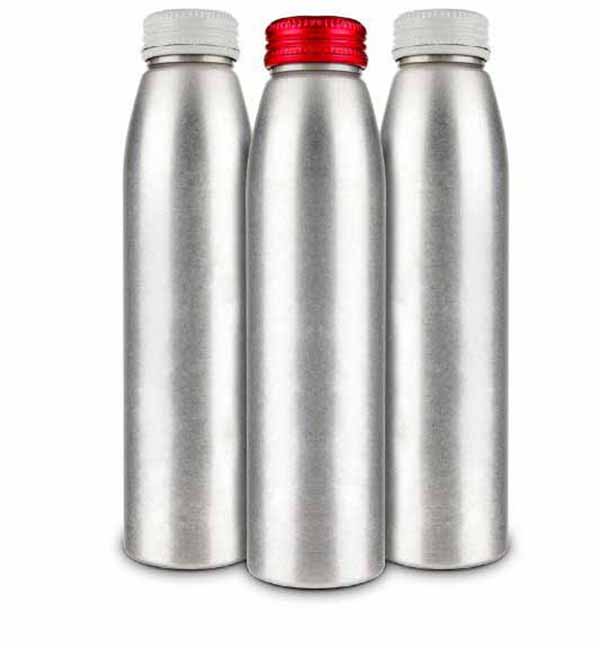Being sure about the safety of drinking from metal water bottles is the first thing anyone should consider before buying a metal water bottle. As people become more aware of environmental issues and the dangers of plastic, many are choosing metal water bottles as a greener option.
However, there are debates about metals leaching into the water which raises concerns about safety. So, what’s the truth? Is it safe to drink from metal water bottles?
In this article, you will get to know whether metal water bottles are safeand how you can select a metal water bottle that is safe and eco-friendly. Let’s get right into it!
Common Metals Used in Water Bottles- Are They Safe to Drink From?
Here’s your informative and detailed answer to the question related to metal water bottle’s safety concerns.
Stainless Steel
The first name that comes into our mind after hearing about metal bottles is stainless steel. This is the most popular metal used for water bottles due to its durability, resistance to corrosion, and ability to keep drinks at a desired temperature.
Stainless steel is non-reactive, meaning it does not leach chemicals into your water. Yes, there’s no risk of chemical leaching, even if the beverages are hot or acidic.
Most stainless steel bottles are made from food-grade materials, like 18/8 or 304 stainless steel. These materials are 100% toxin-free and safe for daily use. They do not leave any metallic taste to your drink as well.

Aluminum
Aluminum is the second most popular choice when it comes to metal water bottles. These water bottles are lightweight and convenient, making them a popular choice for portability.
However, aluminum is a reactive metal that can interact with acidic or carbonated beverages.
This can result in altering the taste and safety of the liquid. To prevent the metallic taste, aluminum bottles are lined with a protective coating made from materials like epoxy resin.
Although this lining is safe, you must choose high-quality, BPA-free bottles to avoid chemical leaching. Otherwise, there will be a question about your drink’s safety when the lining is damaged or worn down.
Copper
Although copper is a less well-known metal used in water bottles, the metal is believed to offer health benefits like better heart and brain health and a stronger immune system.
Copper does have real antibacterial properties. Storing water in a copper bottle for several hours can help kill harmful bacteria, which makes the water safer to drink. This process, known as “contact killing,” works effectively if you leave the water in the bottle for a while.
However, drinking too much copper can be harmful and may cause symptoms like nausea and stomach pain. To stay safe, limit your intake to about 3 cups (710 mL) of copper-infused water per day.
Refill the water every 16 hours to prevent excess copper from leaching into the water and to keep it fresh. As long as you use them correctly, copper bottles usually release a safe amount of copper into the water.
Titanium
Titanium is a lightweight and highly durable metal used in some high-end water bottles.
According to research, titanium water bottles (especially those coated with titanium dioxide or TiO2), are known for their effectiveness in disinfecting water and making it safe to drink. The TiO2 coating acts as a photo-catalyst, which creates strong oxidising agents that break down and eliminate contaminants in the water.
Although titanium bottles are often more expensive, they are safe, durable, and long-lasting.

Safety Concerns Related to Metal Water Bottles
Here are the most common safety concerns regarding metal water bottles that you should keep in mind.
Metal Leaching
One of the main concerns with metal water bottles is the chance of metal leaching. This occurs when metals like aluminum leach into the water, especially when the bottle is exposed to acidic or hot liquids.
Avoid leaving beverages in aluminum bottles without proper lining, as aluminum can react with liquids and cause an unpleasant metallic taste.
BPA and Other Chemical Concerns
Try to purchase bottles that are labelled as BPA-free, which means they don’t have bisphenol A.
BPA is a harmful chemical that’s used in plastics and resins, but it can cause health problems. Studies have linked BPA to issues like hormone disruption, reproductive harm, and increased cancer risk. Because of these concerns, try your best to choose BPA-free bottles to reduce the chances of chemical exposure.
Aluminum Bottles and Lining
You already know about the benefit of protective linings in aluminum water bottles. Although the lining does a great job of preventing chemicals from leaching into your drinks, it can get damaged over time and leach BPA into the water.
Regularly inspect the lining for any scratches or damage, as this could compromise the bottle’s safety.
Metal vs Plastic vs Glass Water Bottles
Knowing the key differences among metal, plastic, and glass water bottles will help you choose the right fit for you.
| Factor | Metal Water Bottles | Plastic Water Bottles | Glass Water Bottles |
| Safety | Generally safe; stainless steel is non-reactive, while aluminum raises a question. | Generally, they’re not safe. Can leach chemicals like BPA, especially when exposed to heat. | Very safe, non-reactive, and free of chemicals. |
| Durability | Very durable and resistant to dents and damage. | Generally durable but can degrade over time. | Fragile and can break or shatter if dropped. |
| Taste | Does not leave any taste to the beverage. | The chance of taste alteration is high. | Pure taste does not affect the flavor of the beverage. |
| Insulation | Excellent at maintaining the temperature of the drinks. | Poor insulation. | Moderate insulation. |
| Environmental Impact | Highly sustainable, recyclable, and long-lasting. | Contributes to plastic waste; many are single-use and not biodegradable. | Environmentally friendly; recyclable. But their production requires more energy. |

FAQs
How Long Can Water Sit in Metal Bottles?
You can safely store water in a metal bottle for up to 24 hours. Metal bottles are great because they don’t leach chemicals into the water. Just make sure to clean the bottle regularly to prevent bacteria buildup. Also, avoid leaving flavoured drinks in the bottle for too long as they can leave a residue. Always refill your bottle with fresh water daily to ensure safety and taste.
How Long Can Water Sit in Metal Bottles?
If the bottle is clean, water can remain safe in a metal bottle for 24 hours, or even longer, depending on the water’s purity. However, if you don’t clean the bottle regularly, it’s best not to store water in it for more than a few days as there’s a high chance of bacteria build-up in a dirty bottle.
Last Words
So, is it safe to drink from metal water bottles?
Yes, drinking from metal water bottles is safe, especially if you choose high-quality materials like stainless steel. These bottles offer durability, environmental benefits, and effective temperature retention. While some metals can leach into beverages, choose BPA-free and properly lined bottles to reduce this risk.

